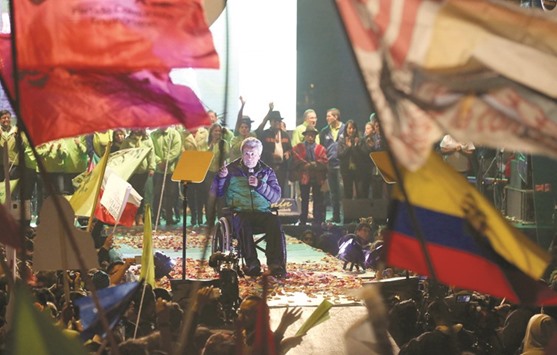Polls show 63-year-old former vice-president Lenin Moreno ahead, but the ruling party candidate, who has used a wheelchair since being shot during a 1998 robbery, appears to be just short of the minimum needed to win outright in the first round.
That would trigger an April 2 run-off, probably against opposition candidate Guillermo Lasso, a 61-year-old former executive president of Banco de Guayaquil.
Disparate opposition factions in the oil-producing country of 17mn people, which stretches from the Andes to the Galapagos Islands, may then unite to support Lasso, giving him an edge over Moreno, analysts said.
Lasso has promised to slash taxes, foster foreign investment and remove Wikileaks founder Julian Assange from the country’s embassy in London, where he is avoiding extradition to Sweden over rape allegations.
A Lasso victory would intensify the return of the right in South America, where Argentina, Brazil and Peru have all shifted away from leftist rule in the past 18 months as a decade-long commodities boom ended.
Moreno, who wants to boost social welfare and has a more conciliatory style than the fiery Correa, has struggled to gain a decisive lead.
Polls show he is unlikely to win more than 40% of valid votes and pocket a 10-point difference with his closest rival as required to avoid a run-off.
Leading pollster Cedatos said this month that 32.3% of Ecuadoreans planned to vote for Moreno versus 21.5% for Lasso.
“You must choose between continuity or change to live better,” said Lasso, who is running for president a second time. “I have experience in creating jobs, I’ve done it in the last 40 years and I can do it for Ecuador.”
A corruption case at Ecuador’s national oil company as well as the Latin America-wide scandal involving Brazilian conglomerate Odebrecht have weighed on Moreno, whose running mate is Jorge Glas, the country’s vice-president and former strategic sectors minister.
To be sure, polls show a significant number of Ecuador’s 12.8mn voters are undecided.
While the ruling party has lost ground during a recession, some disenchanted Correa supporters, who tend to be poorer and more rural, balk at the thought of voting for a wealthy conservative banker.
And another opposition candidate, lawyer and lawmaker Cynthia Viteri, is diverting votes away from Lasso, meaning Moreno might just win on Sunday.
At Moreno’s closing rally in a working-class part of capital city Quito on Wednesday night, supporters waving flags or dressed in traditional Andean clothes chanted: “Do it in one round!”
After extolling social programmes for the elderly, mothers and disabled people, and even breaking into song, Moreno vowed to crack down on corruption, although he did not discuss the Odebrecht or Petroecuador cases.
“We’re proposing major surgery to remove corruption,” Moreno, a former motivational speaker and United Nations envoy on disability, said to cheers. “You don’t steal from the fatherland!”
There have been no polls on a hypothetical second round, but many analysts expect Moreno to be defeated, marking an end to a 10-year rule of Correa’s Country Alliance party.
“A Viteri or Lasso victory would be similarly market-friendly and would include both efforts to attract (Foreign Direct Investment) and an International Monetary Fund (IMF) programme,” consultancy Eurasia said in a note to clients.
Lasso’s pro-business policies have some fixed-income investors betting on a bonanza in Ecuador should he win.
Still, the new president will face high expectations for economic improvements in the midst of low oil prices, a steep fiscal deficit, and onerous debts to top financier China.
The next presidential term starts on May 24 and lasts four years.

